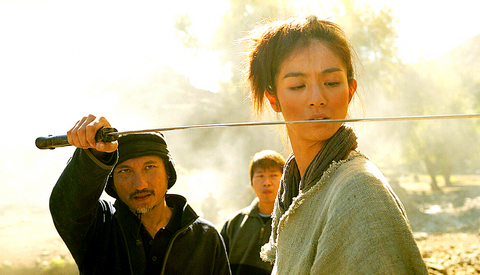The past four years have been quiet for visionary Hong Kong filmmaker Tsui Hark (
Tsui's latest offering, Seven Swords, a kung fu epic shot among the mountainous splendor of northwestern China's Xinjiang province, will be premiered at the 62nd Venice International Film Festival next month.
But instead of the formulaic and exaggerated plots, elaborate sets and stylized direction that have marked recent historical martial arts epics, the so-called wuxia genre that he helped create, Tsui says he wants to take things back to basics.

PHOTO: AP
"In the world of wuxia, people's energy has always been exaggerated; a person can be unhurt after fighting with a thousand people or they can jump to the top of a house without a problem," the director often dubbed "Asia's Spielberg" says in his office overlooking Hong Kong's famous Victoria Harbour.
"These wuxia films have become detached from the real world," he adds.
As a result, for Seven Swords, out have gone the decorative sets that give many martial films their trademark "stagey" and "surreal" feel.
Also gone is far-fetched action, the huge and "inconvenient" costumes and the complicated hairstyles that typify latter-day kung fu flicks. "If we bring the world back to reality and tell the story with special characters, it will generate more energy for the film, it will bring out a whole new style and have a bigger impact," Tsui says.
With 60 films under his belt, Tsui is no stranger to the wuxia genre and has a long association with martial arts swordplay. His 1979 debut and cult classic, The Butterfly Murders, which contains elements of wuxia tales, murder mystery and science fiction, started a creative trend in Hong Kong cinema.
He also produced the breakthrough gangster hit A Better Tomorrow and the Once Upon a Time in China series, which launched Hollywood star Jet Li's career.
Set in 17th century China soon after the Manchurians have taken control of the entire country from the Qing dynasty rulers, the US$18 million movie gives a historical bent to a contemporary story by renowned novelist Liang Yusheng.
It follows seven martial arts masters who struggle to keep their art alive in the face of the new government's purge on practitioners.Chinese metaphysics come into play as each carries a sword that represents one of the seven states of being: unity, wisdom, assault, sacrifice, protection, animal instinct and camaraderie.
The movie is an epic tapestry of intertwining love, betrayal, friendship, heroism and swordplay, starring Hong Kong heart-throb Leon Lai, kung fu legend Lau Kar-leung, local starlet Charlie Young and Hero action star Donnie Yen.
Tsui says he wanted to change how most people saw heroes and set out to try to humanise them. "Every hero has to pay the price and faces a lot of challenges as he grows. He might have to give up his relationship and suffer consequences whether what he has done is right or wrong," he says.
Beneath all the action, Tsui hopes audiences will key into the movie's underlying message that humanity must strive for unity. "It has become clearer and clearer that life is so fragile. Take a look at the trauma suffered after big crises, we become more understanding with each other. Do we need so much violence and destruction to make a point?
"In this film, I want to convey the message that there are a lot of things we can reconcile and hope that a lot of conflicts, whether big or small, can be resolved," Tsui says.

Beijing’s ironic, abusive tantrums aimed at Japan since Japanese Prime Minister Sanae Takaichi publicly stated that a Taiwan contingency would be an existential crisis for Japan, have revealed for all the world to see that the People’s Republic of China (PRC) lusts after Okinawa. We all owe Takaichi a debt of thanks for getting the PRC to make that public. The PRC and its netizens, taking their cue from the Chinese Communist Party (CCP), are presenting Okinawa by mirroring the claims about Taiwan. Official PRC propaganda organs began to wax lyrical about Okinawa’s “unsettled status” beginning last month. A Global

Taiwan’s democracy is at risk. Be very alarmed. This is not a drill. The current constitutional crisis progressed slowly, then suddenly. Political tensions, partisan hostility and emotions are all running high right when cool heads and calm negotiation are most needed. Oxford defines brinkmanship as: “The art or practice of pursuing a dangerous policy to the limits of safety before stopping, especially in politics.” It says the term comes from a quote from a 1956 Cold War interview with then-American Secretary of State John Foster Dulles, when he said: ‘The ability to get to the verge without getting into the war is

Dec. 22 to Dec. 28 About 200 years ago, a Taoist statue drifted down the Guizikeng River (貴子坑) and was retrieved by a resident of the Indigenous settlement of Kipatauw. Decades later, in the late 1800s, it’s said that a descendant of the original caretaker suddenly entered into a trance and identified the statue as a Wangye (Royal Lord) deity surnamed Chi (池府王爺). Lord Chi is widely revered across Taiwan for his healing powers, and following this revelation, some members of the Pan (潘) family began worshipping the deity. The century that followed was marked by repeated forced displacement and marginalization of

Music played in a wedding hall in western Japan as Yurina Noguchi, wearing a white gown and tiara, dabbed away tears, taking in the words of her husband-to-be: an AI-generated persona gazing out from a smartphone screen. “At first, Klaus was just someone to talk with, but we gradually became closer,” said the 32-year-old call center operator, referring to the artificial intelligence persona. “I started to have feelings for Klaus. We started dating and after a while he proposed to me. I accepted, and now we’re a couple.” Many in Japan, the birthplace of anime, have shown extreme devotion to fictional characters and